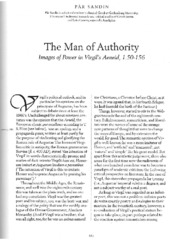The Man of authority: images of power in Virgil’s Aeneid 1.50–156
| dc.contributor.author | Sandin, Pär Ola | eng |
| dc.date.accessioned | 2010-04-12T07:53:02Z | |
| dc.date.available | 2010-04-12T07:53:02Z | |
| dc.date.issued | 2000 | eng |
| dc.Published | In: Anders Jönsson och Anders Pilt (eds.), Språkets speglingar: festskrift till Birger Bergh (2000): 187-194 | en |
| dc.identifier.isbn | 9187976137 | |
| dc.identifier.uri | https://hdl.handle.net/1956/3868 | |
| dc.description.abstract | In Aen. 1.50-156, Aeolus, king of winds, enforces his will by /imperium/, /vincla/ ('fetters') and /carcer/ ('imprisonment'), but his vanquisher, Neptune, lord of the sea, by /dictis/ ('words'), hence relying on natural authority (auctoritas). This is the central theme of Augustan propaganda, which portrayed Augustus as a statesman in the old Roman tradition in contrast to the oriental despotism of Mark Antony. Augustus is also portrayed as Neptune trampling an enemy, probably Antony, on a contemporary cameo relief. | en_US |
| dc.language.iso | eng | eng |
| dc.publisher | Skåneförlaget | eng |
| dc.subject | Vergil | eng |
| dc.subject | Aeneid | eng |
| dc.subject | Augustus | eng |
| dc.subject | Auctoritas | eng |
| dc.subject | Aeolus | eng |
| dc.subject | Neptune | eng |
| dc.title | The Man of authority: images of power in Virgil’s Aeneid 1.50–156 | eng |
| dc.type | Chapter | |
| dc.rights.holder | Copyright the author. All rights reserved | |
| dc.rights.holder | The Author | eng |
| dc.subject.nsi | VDP::Humaniora: 000::Språkvitenskapelige fag: 010::Klassisk filologi: 032 | |
| dc.subject.nsi | VDP::Humaniora: 000::Litteraturvitenskapelige fag: 040::Klassisk litteratur: 054 |
